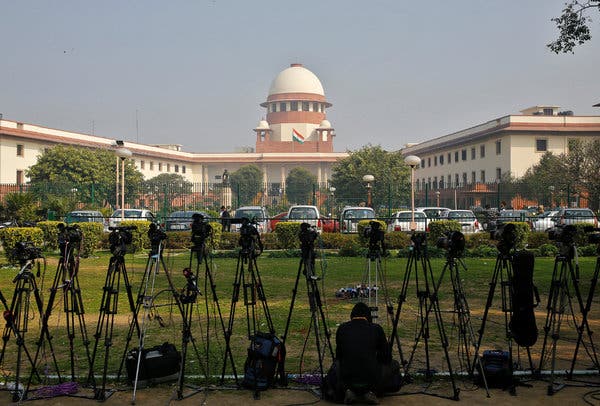Islamic missionary at centre of India’s Covid-19 outbreak
By early March, coronavirus disease (Covid-19 )cases were surging across the world. In India, where their number had just begun to rise, there was an air of caution though a lockdown was still several days away. Ignoring the pandemic, an estimated 2,500 Sunni Muslim men belonging to several nationalities, each identically dressed in a white gown and skullcap, checked into a five-storey establishment called Markaz in Delhi’s Nizammudin area, part of a yearly routine.
Markaz is a clearing house for these committed teams of Islamic missionaries, known as the Tablighi Jamaat. Individual missions are small, consisting of four or five men, each booked on flights and trains to various states and countries. The building isn’t a mosque. It’s a facility with bare dormitories. “It’s actually a transit point, where logistics are planned,” said Navaid Hamid, president of the All-India Muslim Majlis-e-Mushwarat, a social organisation of the community.
The authorities now fear the Markaz waypoint has become a coronavirus transmission hub, with 24 preachers testing positive in Delhi alone between Sunday and Monday.
The Markaz facility is also known as the global headquarters of Tablighi Jamaat, a preaching movement founded in 1927 by Maulana Mohd Ilyas in Haryana’s Mewat. Tablighi Jamaat (Arabic for “group that propagates faith”) is one of the most widespread missionary movements in Islam globally but seeks to be low-profile. It is not a sect in itself.
Members often describe the Tablighi Jamaat to be non-political, committed to nothing more than goading Muslims into following Islamic precepts. Participation is purely voluntary, and most members belong to professional occupations.
“Our groups aren’t large. We can’t afford it. It’s at best three or four,” said Syed Irfan Malik, a resident of old Delhi, who travelled to Malaysia and Indonesia in 2017 as a preacher.
Preachers usually stay in mosques and lecture people. They usually carry nothing more than foodstuff, sleeping bags, and cooking stoves.
One key task is to make non-conformist Muslims ”return” to the faith. The missionaries frequently quote from the Quran, highlighting passages that speak of certainty of hellish punishment for sinners and rewards for the virtuous.
Positive coronavirus cases among these preachers have set off alarm bells now, but the organisation contends its members were trapped because of the lockdown. The authorities made no arrangement to evacuate them in time, it said in a statement.
“On March 21, 2020, a large group of visitors who had to depart by railways got stuck in the Markaz premises. On March 22, 2020, the Janata Curfew was observed and visitors were advised not to venture out until 9pm,” the statement said.
According to the Markaz’s statement, on 24th March 2020, a notice was issued by the police, seeking closure of the premises. “The same was responded to on 24th March 2020, stating the compliance of the directions regarding closure of Markaz is already underway,” it said.
However, a day before the notice, on March 23, around 1,500 preachers had already managed to leave for various destinations, leaving around 1,000 visitors “belonging to different states and nationalities inside the Markaz”, the organisation said.
There were, however, at least three other Delhi government orders that the organisation appears to have violated — on March 11, chief minister Arvind Kejriwal curtailed all gatherings to 200 people; on March 16, he brought this down to 20 and banned all religious gatherings; and on March 21, the Delhi government further brought down the limit on gatherings to five.
A few of the preachers who left before the lockdown kicked in March 25 started developing symptoms, such as a temperature and cough, but nobody thought of the possibility of getting the coronavirus disease, a member of the Markaz said. Members continued to be locked up in cramped quarters because of the lockdown.
Tablighi Jamaat has no central administrative structure and its activities are coordinated by volunteers. Without this, there were no general guidelines on Covid-19.
An administrator of the Markaz house, however said: “During this entire episode, Markaz Nizamuddin never violated any provision of law. It did not let them (preachers) violate medical guidelines.”
“Why did the authorities fail to move out the preachers to government quarantine facilities? Why were foreigners not separated from Indian nationals? The local magistrate should be sacked,” said Hamid of the Majlis-e-Mushwarat.
Since the 9/11 attacks, the group has been under scrutiny everywhere, including in India, because members of terror outfits have been found to disguise themselves as Tablighi Jamaat members. “This is a conspiracy against us. Coronavirus is worrying but Allah will guard us,” said Malik, the former Tablighi Jamaat member quoted above.
“The authorities seem to have failed to check the Markaz establishment for crowds because it is known to be filled with preachers in transit year round. It missed their radar,” Mohammed Akramuddin, a retired customs officer who resides in the area said.
HT






